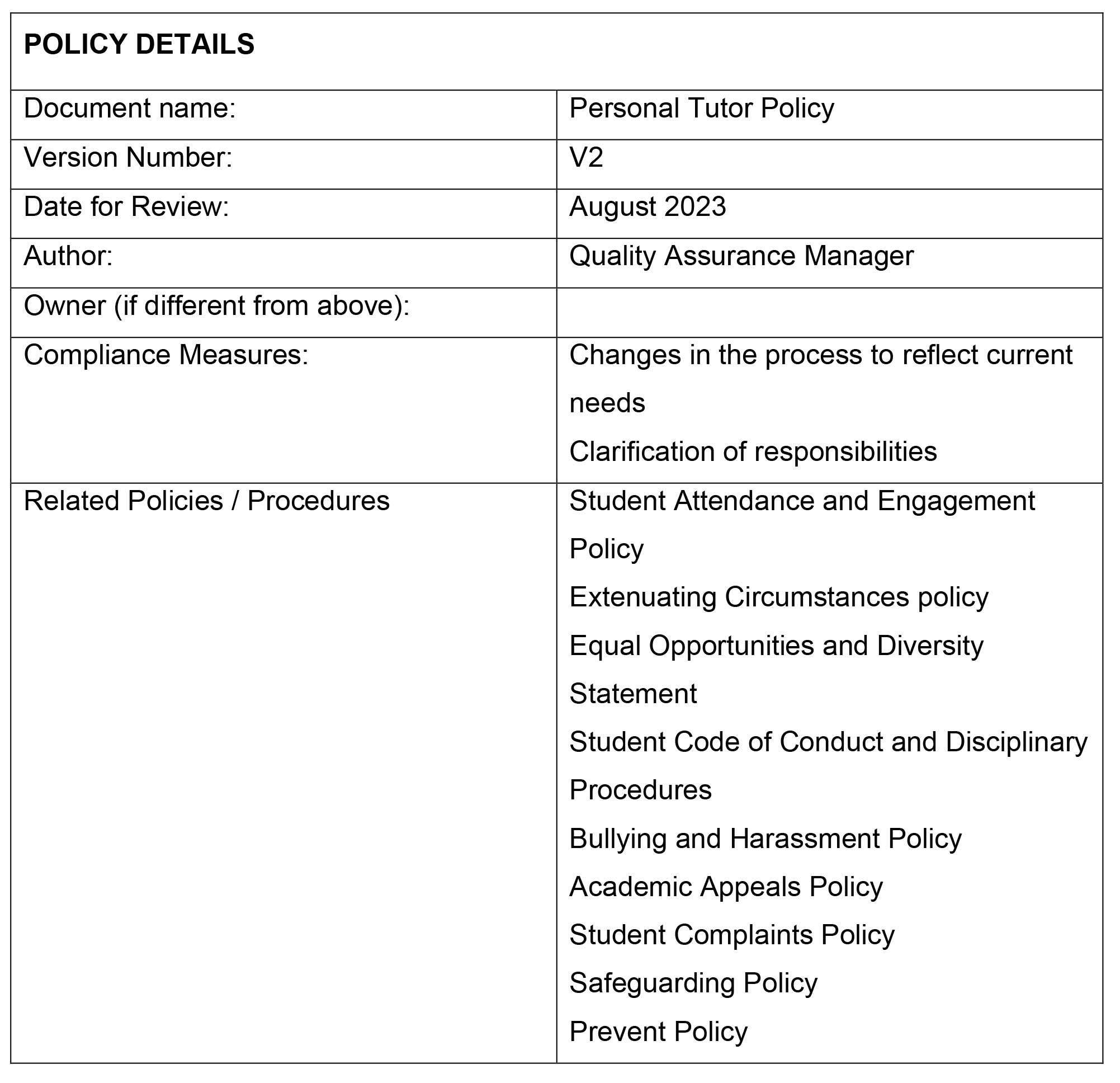1. Introduction
Personal Tutor Policy
1.1 To deliver its strategic policy aims of excellence in: Learning, Teaching and Assessment and the Student Experience, Results Consortium Ltd. (thereafter ‘the College’) has a personal tutor system that enables every student to develop their academic, personal and professional potential while feeling a valued and respected member of the Results’ collegiate environment.
1.2 The use of Personal Tutors is part of the College’s planned compliance with the UK Quality Code for Higher Education. In particular when establishing a personal tutor system, as described in this procedure, compliance with core practices Q4 and Q9
The UK Quality Code sets out the following Expectations:
Q4: The provider has sufficient and appropriate facilities, learning resources and student support services to deliver a high-qualityacademic experience.
Q9: The provider supports all students to achieve successful academic and professional outcomes.
1.3 The College expects all Personal Tutors, Teaching Staff and student support services to be actively engaged in promoting and supporting student well- being.
1.4 This policy should be considered alongside other College policies, including Student Attendance and Engagement Policy, Extenuating Circumstances, Equal Opportunities and Diversity Statement, Student Code of Conduct and Disciplinary Procedures, Bullying and Harassment Policy, Appeals Policy, Student Complaints Policy, Safeguarding Policy and Prevent Policy.
2 Personal Tutoring
2.1 Personal tutoring provides academic and pastoral support for all students.
2.2 All teaching staff will normally be expected to carry out Personal Tutor activities as part of their teaching and learning role. The primary role of the personal tutor is to provide general advice and pastoral support. If students have questions about a specific unit (e.g regarding assessment) they should be referred to talk to the tutor of that unit.
2.3 Each enrolled student should have a named personal tutor to provide general
guidance on academic and non-academic issues and to suggest sources of support.
2.4 Any information provided to the Personal Tutor will usually be treated as confidential and will generally not be shared, unless the student consent, or unless the information shared with the Personal Tutor suggests that a person is at risk of harm.
3 Responsibilities/span>
3.1 Personal tutors are expected to:
a) provide advice and support on academic issues, help students understand College regulations and policies and offer students opportunities to reflect upon their progress
b) be available to meet with their students provided that student requests are reasonable. They should be aware of the boundaries of their role and seek support when required.
c) meet with their new tutees, either as a group or individually, in the first term of each academic year (level of studies).
d) maintain meeting records, handle disclosures and report issues if/when they arise to the relevant College service.
e) identify students with particular educational support needs and advise on appropriate support available.
3.2 Students are expected to:
a) initiate contact with their personal tutors when required. If students have difficulty in making contact with their Personal Tutor, they should contact the Student Welfare Team
b) engage with their personal tutor to enhance their academic and personal
development,
c) and attend all scheduled meetings, prepare adequately to attend these meetings and work to address any actions agreed
d) inform their personal tutor of any difficulties they may have in a timely manner so that they can be supported effectively.
3.3 The College will:
a) as soon as possible, allocate each student a personal tutor at the commencement of the student’s programme of study. Personal tutor’s contact details will be communicated to students via email and Canvas
b) ensure that teaching staff participate in relevant professional development and provide appropriate awareness of processes and policies that relate to student engagement and support
c) ensure that Personal Tutors have access to appropriate information about students (in line with data protection guidelines)
d) facilitate regular reviews of Personal Tutoring effectiveness
3.4 The Higher Education Manager will:
a) regularly monitor the level of student engagement and the effectiveness of Personal Tutoring and make appropriate interventions as required
b) advise personal tutors, ensure that they have
b) advise personal tutors, ensure that they have
b) b) advise personal tutors, ensure that they have adequate information and induct new personal tutors to their role.
c) identify staff development needs with regard to providing academic and pastoral support
d) ensure that all students have a Personal Tutor and that the names and contact details of the personal tutors are made available on Canvas as soon as the programme commences.
e) explaining to students, during induction, the role of personal tutor and how
they will be informed who their personal tutor is
f) consider requests for reallocation of a named personal tutor where appropriate
g) ensure that students will be assigned to a new personal tutor if the personal tutor is unavailable for an extended period
4 Process
4.1 The Higher Education Manager, with the support of Student Welfare Team, will allocate a Personal Tutor to each enrolled student. It is considered good practice for a Personal Tutor to keep the same students throughout their programme of study
4.2 Students will be informed of the name and contact details of their Personal Tutor after the induction event(s)
4.3 Personal Tutors will be informed of the names and contact details of their tutees after the induction event(s)
4.3 The first meeting will take place in the first weeks of the first term and Personal Tutors and students will set boundaries and encourage communication through a mutually preferred method.

